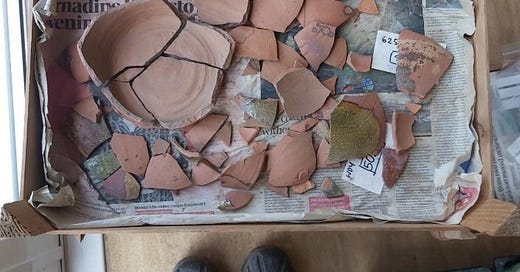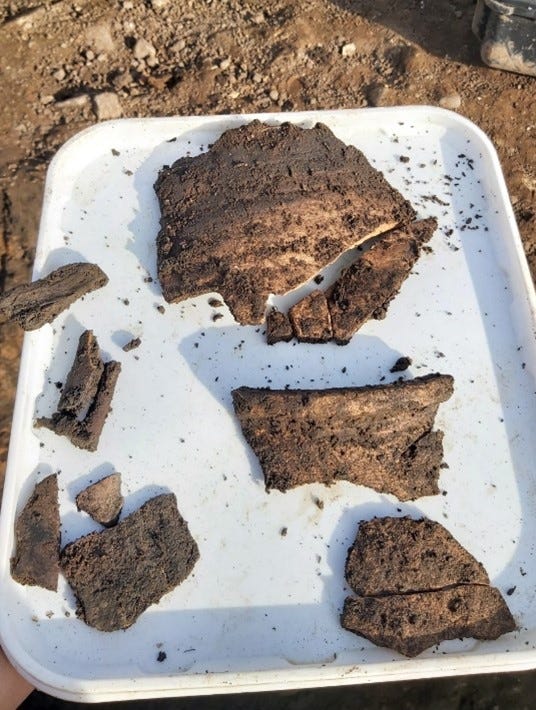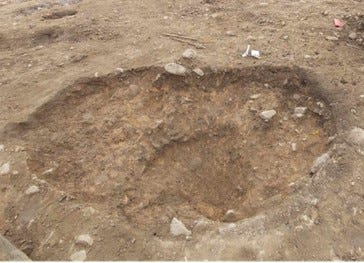The glamour of archaeology is maintained for those who work indoors – in universities, in museums, or post-excavation. When deciding what to do with an archaeology degree, this should be remembered.
Students of archaeology are immediately faced with the reality of the discipline on their first soggy, wet day of university field school… so what can you take from an archaeology degree and how can it be used in the world beyond university?
Developing practical experience at university is a sure way to understand how fieldwork in archaeology works, the reality of the conditions the work is carried out in, and the expectations placed upon a field archaeologist. This is not to say that what is learnt at university is not useful, far from it. Knowledge and practical experience beyond fieldwork will stand any student of archaeology in good stead, especially if they pursue a role as a commercial archaeologist.
How to put an archaeology degree to good use in a commercial archaeology job
The study of archaeology and practice of archaeology are indeed quite different. At first, commercial archaeology may not bear much relation to what is studied in university classrooms. Books and essays do not necessarily set the student up well for digging holes in a field. However, the more time spent practising archaeology, the more the theory and practice learnt at university comes in handy.
Modules
Being narrow with your module choices pays off for those lucky few who have a specific career path in mind, but if, like most people during an undergraduate degree, a specific path is not yet evident, then choosing a variety of modules that are not too narrow would provide a competitive range of knowledge. Some useful modules for working in the field are GIS, geophysical surveying and finds identification modules such as osteology, zooarchaeology, and pottery identification.
In commercial archaeology, a lot of time is spent outdoors in the field, but opportunities to use GIS and geophysical surveys may arise, although this tends to vary between commercial units. Modules in human bone, animal bone, and pottery identification would be more useful when in the field. Recognising and understanding finds whilst excavating in commercial archaeology will help in understanding and dating features, and later improve the interpretations of the site!
Pottery found on site (Photo: Rachel Glaves)
Specialisms
Specialisms are not to be shunned and can be of value when working in commercial archaeology. Employment in post-excavation roles can benefit from an individual’s specialism such as osteology or zooarchaeology. Whilst not something that everyone may work with every day; it is likely that interactions with things associated with an individual’s specialism whilst in the field and in post-excavation may occur. The further into a career people get the more chance of working in a specialism.
Pottery in Post-Excavation (Photo: Rachel Glaves)
Developing Your Knowledge
The knowledge a university leaver holds is largely academic and not necessarily knowledge that will be of immediate benefit in the field. This is not to say that academic knowledge is not useful in commercial archaeology, it absolutely is, but developing additional knowledge whilst in the field will be more practical.
Pit being excavated on site. (Photo: Rachel Glaves)
First, learning to identify features on different soil types, can sometimes take time to adjust to and seeing features in different geologies is a practice-based skill. Second, the development of a little mind bank of feature types and how to recognise them, such as pits, postholes, ditches and so on is needed. Other knowledge that should develop is of the most effective and efficient way to excavate different features, and how to record these features according to industry standards and the standards of whichever unit you are working for. The knowledge developed whilst in the field, alongside academic knowledge, makes a more rounded archaeologist.
How to develop your practical experience whilst a student
Getting your first archaeology job following university can be competitive and a shock to the system. Gaining practical experience whilst studying is invaluable for when you start applying for jobs post-graduation.
One way to develop practical experience is through choosing practical modules as mentioned and gaining practical experience through reaching out to lecturers and local commercial units.
Unfortunately, the industry is not always the easiest to gain experience in, paid experience is even harder to find, but gaining experience outside of research digs will really help in the long run. University lecturers may be able to help students gain experience, whether that be through commercial contacts or academic contacts.
Prioritise gaining commercial experience. The difference between student excavations and commercial excavations is stark. Student excavations tend to be department funded, research led, provide all tools, and offer a variety of training. Commercial excavations on the other hand tend to be funded by developers and done out of necessity. Archaeologists in these roles are expected to have their own tool kit (other than mattocks and shovels of course) and these excavations have a lot of time pressures.
Being prepared for a job in archaeology is key to easily transitioning between university and the field. Once you understand the reality of archaeology, the transition is far easier!
Rachel Glaves is a trained landscape historian and archaeologist. She has spent two years working in the UK commercial archaeology industry. Her interests lie in British Neolithic archaeology (particularly Scottish Neolithic archaeology), GIS and making archaeology accessible, having also worked briefly in the museum industry and commercial archaeology.
References and Resources:
www.bajr.org. (n.d.). Get an archaeology Job | BAJR. [online] Available at: http://www.bajr.org/Employment/getajob.asp [Accessed 6 Nov. 2024].
Archaeologists.net. (2023). Professional pathways | Chartered Institute for Archaeologists. [online] Available at: https://www.archaeologists.net/join/pathway [Accessed 6 Nov. 2024].
CBA (2024). Pathways into Archaeology. [online] Archaeologyuk.org. Available at: https://www.archaeologyuk.org/discover/pathways-into-archaeology.html [Accessed 6 Nov. 2024].
Allen Archaeology. (2016). The Archaeological Toolbox. [online] Available at: https://www.allenarchaeology.co.uk/the-archaeological-toolbox/ [Accessed 6 Nov. 2024].







